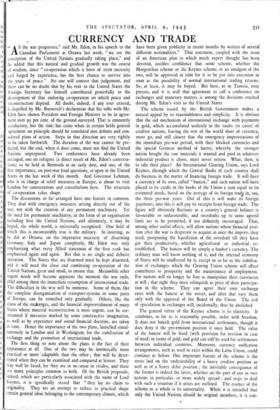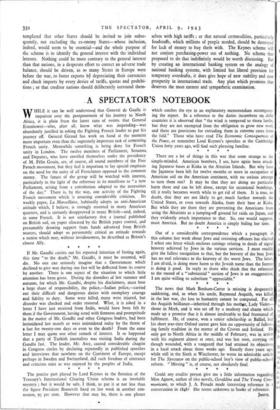••• CURRENCY AND TRADE " A S the war progresses,"
said Mr. Eden, in his speech to the /11 Canadian Parliament at Ottawa last week, " we see the conception of the United Nations gradually taking place," and he added that this natural and gradual growth was the course of wisdom, since "co-operation which is born of stern necessity and forged by experience, has the best chance to survive into the years of peace." No one will contest that judgement, and there can be no doubt that by his visit to the United States the Foreign Secretary has himself contributed powerfully to the development of that enduring co-operation on which peace and reconstruction depend. All doubt, indeed, if any ever existed, is dispelled by Mr. Roosevelt's declaration that his talks with Mr. Eden have shown President and Foreign Minister to be in agreement over 95 per cent. of the ground surveyed. That is eminently satisfactory, but the time has come when in certain fields general agreement on principle should be translated into definite and considered plans of action. Steps in that direction are very rightly to be taken forthwith. The duration of the war cannot be predicted, but the end, when it does come, must not find the United Nations unprepared. Two conferences have already been arranged, one on refugees (a direct result of Mr. Eden's conversations) to be held m Bermuda at an early date, and one, of the first importance, on post-war food questions, to open in the United States in the last week of this month. And Governor Lehman, who is in charge of relief measures in Europe, is about to visit London for conversations and consultations here. The structure of co-operation takes shape.
The discussions so far arranged have one feature in common. They deal with emergency measures arising directly out of the war, not with the creation of any permanent machinery. Yet the need for permanent machinery, in the form of an organisation including first the United Nations, and ultimately, it may be hoped, the whole world, is universally recognised. One field of which this is incontestably true is the military. In insisting, as he did at Ottawa, on the imperative necessity of disarming Germany, Italy and Japan completely, Mr. Eden was only emphasising what every Allied statesman of the first rank has emphasised again and again. But that is no single and definite operation. The States that are disarmed must be kept disarmed, and it will need the close and continuing co-operation of the United Nations, great and small, to ensure that. Meanwhile other urgent needs will become apparent the moment the war ends, chief among them the immediate resumption of international trade. The difficulties in the way will be immense. Some of them, like the complete disorganisation of transport-systems in some parts of Europe, can be remedied only gradually. Others, like the chaos of the exiahanges, and the financial impoverishment of many States where material reconstruction is most urgent, can be surmounted if measures marked by some constructive imagination, as well as by experience and sound financial doctrine, are taken in time. Hence the importance of the two plans, launched simultaneously in London and in Washington, for the stabilisation of exchange and the promotion of international trade.
The first thing to note about the plans is the fact of their appearance at all. One of the two may be intrinsically more practical or more •adaptable than the other ; that will be determined when they can be examined and compared at leisure. They may well be fused, for they are in no sense in rivalry, and there are many principles common to both. Of the British proposals, Indeed, which are particularly associated with the name of Lord Keynes, it is specifically stated that "they lay no claim to originality. They are an attempt to reduce to practical shape certain general ideas belonging to the contemporary climate, which have been given publicity in recent months by writers of several different nationalities." That statement, coupled with the issue of an American plan to which much expert thought has been devoted, justifies confidence that some scheme, whether the Morgenthau scheme or the Keynes scheme, or an amalgam of the two, will be approved in tinie for it to be put into execution as soon as the possibility of normal international trading returns. So, at least, it may be hoped. But here, as in Tunisia, time presses, and it is well that agreement to call a conference on exchanges and monetary matters is among the decisions reached during Mr. Eden's visit to the United States.
The scheme issued by the British Government makes a natural appeal by its reasohableness and simplicity. It is obvious that the old mechanism of international exchange with payments in gold, which accumulated uselessly in the vaults (or caves) of creditor nations, leaving the rest of the world short of currency, must go, and still clearer that the emergency improvisations of the immediate pre-war period, with their blocked currencies and the special German method of barter, whereby the stronger nation bought the raw materials it wanted and paid in whatever industrial product it chose, must never return. What, then, is to take their place? An International Clearing Union, says Lord Keynes, through which the Central Banks of each country shall do business in the matter of financing foreign trade. It will have a currency of its own, called "bancor," and each nation will have, placed to its credit in the books of the Union a sum equal to its estimated needs, based on the average of its foreign nags in, say, the three pre-war years. Out of this it will make its foreign payments, into this it will pay its receipts from foreign trade. The figure will obviously fluctuate as a country's general balance is favourable or unfavourable, and overdrafts up to some agreed limit are to be permitted, if not definitely encouraged. That, among other useful effects, will allow nations whose financial posi tion after the war is desperate to acquire at once the imports they need, postponing the liquidation of the overdraft till they have got their productivity, whether agricultural or industrial, re established. The bancor will be simply a banker's currency. The ordinary man will know nothing of it, and the internal economy of States will be unaffected by it, except in so far as the stabilisa tion of exchanges which the Clearing Union scheme will effect contributes to prosperity and the maintenance of employment. For nations will no longer be free to manipulate their currencies at will ; that right they must relinquish as price of their participation in the scheme. They can agree their own exchange rates with the bancor at the outset, and after that vary them only with the approval of the Board of the Union. The evil of speculation in exchanges will, incidentally, thus be abolished.
The general virtue of the Keynes scheme is its elasticity. It combines, so far as is reasonably possible, order with freedom.
It does not banish gold from international settlements, though it does deny it the pre-eminent position it once held. The value of the bancor will be fixed (with provision for revision in case of need) in terms of gold, and gold can still be used for settlements between individual countries. Moreover, currency unification arrangements, such as used to exist within the Latin Union, could continue as before. One important feature of the scheme is the stress laid on the undesirability of a heavy creditor position as well as of a heavy debit position ; the inevitable consequence of the former is indeed the latter, whether on the part of one or two nations in particular, or more widely spread ; and steps to deal with such a situation if it arises are outlined. The essence of the scheme as a whole is its universality. While it is intended that only the United Nations should be original members, it is con templated that other States should be invited to join subsequently, not excluding the ex-enemy States—whose inclusion, indeed, would seem to be essential—and the whole purpose of the scheme is to identify the general interest with the individual interest. Nothing could be more contrary to the general interest than that nations, in a desperate effort to correct an adverse trade balance, should be driven, as so many States in Europe were before the war, to foster exports by depreciating their currencies and check imports by every device of tariffs, quotas and prohibitions; or that creditor nations should deliberately surround them selves with high tariffs ; or that natural commodities, particularly foodstuffs, which millions of people needed, should be destroyed for lack of money to buy them with. The Keynes scheme will not conjure purchasing-power out of nothing. No scheme that proposed to do that indefinitely would be worth discussing. But by creating an international banking system on the analogy of national banking systems, with limited but liberal provision for temporary overdrafts, it does give hope of new stability and new prosperity in international trade. Any plan which promises that deserves the most earnest and sympathetic examination.























 Previous page
Previous page